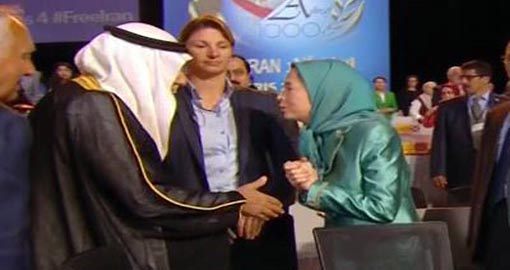Prince Turki al-Faisal’s hostile remarks against Tehran in the annual gathering of the Mujahedin Khalq Organization and his promises to stand by the MKO seems to be a total failure for both sides of the alliance.
The Saudi policies aimed at destabilizing its rival Islamic Republic –as a powerful neighbor and an influential country in the Muslim world—sounds to have formed new stances that are now overt rather than covert. Prince Turkie who presumably have been authorized by his peers in the Saudi regime cheers up the MKO-gathered audience by saying, “I, too, want the downfall of the regime.”
But, this plain sponsorship for the destructive cult of Rajavi with a dark history of violence and human rights abuse will not work. As the New York-based journalist on U.S. foreign policy, Ali Gharib writes, “If Saudi Arabia is on a quest to paint itself as a responsible actor in the region, the kingdom took a big step backward over the weekend.”[1]
It’s truly “a big step backward” and as Barbara Slavin Acting Director of the Future of Iran Initiative at the Atlantic Council in Washington, asserts in her article on Turkie Feisal’s support for the MKO, “mixing with the MEK is a recipe for disaster and a distraction from the region’s and the world’s real enemy – the group that calls itself the Islamic State.”[2]
Slavin confirms rumors about Saudis’ long-standing support for the MKO, “It’s entirely possible that the Saudis have funded the MEK for years.” [3] So, In case of Turkie and other rich Arab figures MKO’s speaking fees do not create the motivation to take such hostile stances against the Islamic Republic. “The Sunni Gulf states—flush with petrodollars and bearing sectarian grudges against Shiite Iran in a regional battle for hegemonic primacy—have long been suspected as a source of funding for MEK’s lavish spending, but no reliable reports have definitively established where the group gets its cash,” writes Ali Gharib. “Al-Faisal’s public move in support of the group certainly provides one more piece of evidence to link Gulf States to MEK’s financing.”[4]
He explains, “Although MEK is famous for lavishing money on its supporters—paying as much as $50,000 for a short speech and investing in politicians through campaign contributions—al-Faisal, as a member of Saudi Arabia’s super-rich royal family, probably scoffs at the sort of cash MEK offers. Instead, al-Faisal attended for obvious reasons: to put a thumb in Iran’s eye.”[ 5]
Actually, Saudi’s financial and spiritual support for the MKO is already a failed investment because the MKO is notoriously known to Iranians and many others in the international community. “Contrary to the MEK’s claims, there is nothing democratic about this cultist organization, which requires its members to divorce their spouses or remain celibate and engage in Maoist-style struggle sessions of self-humiliation”, Slavin warns. “Those that manage to escape often require long periods of de-programming.” [6]
And this is Ali Gharib’s account about the MKO’s situation among all Iranians in general: “Let’s be blunt: MEK is neither a viable agent for regime change in Iran nor the “government-in-exile” the group pretends to be. They enjoy almost no support among Iranians at home or abroad. Exiled royalists hate them for their terror war against the Shah’s regime and their part in the Islamic Revolution. Inside the country, they are reviled across the political spectrum for siding with Saddam Hussein—and fighting against Iranians—in the Iran-Iraq war.” [7]
The MKO has carried out numerous terrorist attacks against Iranian civilians and government officials over the past three decades. Out of the nearly 17,000 Iranians killed in terrorist attacks since the Islamic Revolution, about 12,000 have fallen victim to MKO’s bombings, mortar attacks and other violent acts.
Robert Macey of the Intercept cites from an Iranian scholar Ariane Tabatabai of Georgetown University _who describes the MKO as “cult-like dissident group”_ what the Iranians feel about the MKO. “If the current government is not Iranians’ first choice for a government, the MEK is not even their last — and for good reason,” tells Ariane Tabatabai to Robert Macey. “Today, the MEK is viewed negatively by most Iranians, who would prefer to maintain the status quo than rush to the arms of what they consider a corrupt, criminal cult.” [8]
Saudi transformation from a sponsor of Syrian rebels particularly ISIS to a state sponsor of the terrorist cult of Rajavi indicates the failure of previous proxy wars and a new endeavor to confron Iran. However, the new choice is not reliable at all. The common enmity for Iran does makes an absolutely idiot alliance.
As a matter of fact, ISIS is losing ground in Syria and Iraq and eventually Saudi Arabia is largely losing the capacities to use terrorist groups against its rival. Thus, the kingdom is beating the dead horse of “the late Massoud Rajavi”.
Mazda Parsi
References:
[1]Gharib, Ali, Saudi Supports Anti-Iran MEK Fanatics Mujahedin Khalq Organization as a terror group, Lobelog, July16, 2016
[2] Slavin, Barbara, Saudi Backing of Iranian Exile Group Inflames Mideast Conflicts, Voice of America
July 11th, 2016
[3] ibid
[4] Gharib, Ali, Saudi Supports Anti-Iran MEK Fanatics Mujahedin Khalq Organization as a terror group, Lobelog, July16, 2016
[5] ibid
[6] Slavin, Barbara, Saudi Backing of Iranian Exile Group Inflames Mideast Conflicts, Voice of America
July 11th, 2016
[7] Gharib, Ali, Saudi Supports Anti-Iran MEK Fanatics Mujahedin Khalq Organization as a terror group, Lobelog, July16, 2016
[8]Mackey, Robert, Newt Gingrich Pals Around With Terrorists Saddam Hussein Once Armed, the Intercept, July 11, 2016

